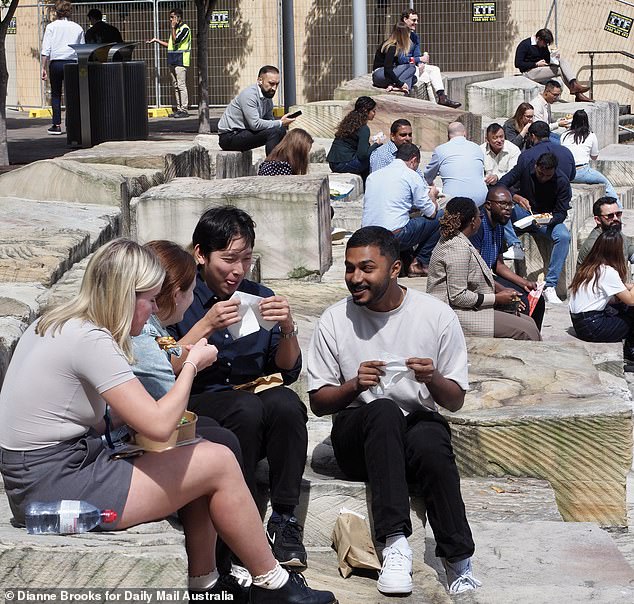Australia’s central business districts are bustling again, thanks to a resurgence of employees returning to the office as companies impose stricter work-from-home policies.
Just two years ago, Sydney’s CBD was eerily quiet following the Covid-19 lockdowns. This crisis devastated the small businesses that remained in the area.
Today, however, the situation has changed. Workers are returning in large numbers, transforming the CBD into a hive of activity once again.
So what do workers really think about bosses demanding a return to office work? Daily Mail Australia interviewed people in Sydney to find out.
Jake, who works in finance, said his employer increased the number of days workers are expected to be in the office to five days a week.
Sydney CBD workers (pictured) have opened up about working from home.

While companies initially pushed to return to the office full time, some have since committed to a hybrid work schedule for those accustomed to working from home.
‘There are elements of flexibility that they have maintained. If you need to work from home for any reason, you can do that,’ she said.
‘Once upon a time everyone was in the office, so for me everything is back to normal and I’m okay with that.
“There are a lot of people who started working during Covid and it’s new to them and they feel it’s quite difficult.”
“A big part of my job is the customer base, so seeing customers makes a big difference. I think it’s really important to get face to face with that part of the business again.”

Jake (pictured), a finance worker, said he prefers to go to the office five times a week to meet face-to-face with clients and work collaboratively with his co-workers.
Nuno, who is an architect, said he is happy to be back in the office with his team.
“For our business, we discuss ideas in the office,” he told Daily Mail Australia.
“People need to work together to create good spaces, especially because we also have staff who don’t have a lot of experience, so we need to be there to advise them.”
But not everyone wants to return to the office.
One worker said: ‘I was forced to return to the office. I’ll find another job. In the meantime, I will work 7.6 hours a day. Not a second more or less.
Another added: ‘My office went from working full-time from home for two years to returning to working full-time, effective immediately, according to the email. I came back for a few weeks, hated it, and then left.
While some companies require their employees to return to the office five days a week, many others offer flexible work arrangements.
Consultant Arun revealed that he enjoyed the flexibility of working from home because it allowed him to look after his two-year-old son.
“It’s easier to pick him up, send him to daycare and just be there if something needs attention,” she said.
“The company I work for is very flexible in terms of work organization, so there is no need to come to the office if it is not necessary.”
Arun only goes to the office about once a week when he needs to attend urgent meetings, but he often has stretches of weeks where he works from home.
Two workers at one of the big four banks, who preferred to remain anonymous, praised their management for approving a flexible work environment.

Architect Nuno (left) said his industry needed concerted efforts to create “big spaces”, adding that working in the office meant he could mentor younger architects.

Consultant Arun (pictured) only goes to the office to attend serious meetings.
“The way they’ve approached this, at least for us, has been really positive,” one of them said.
“They still encourage us to come, they see the value of face-to-face relationships, but they also see the value of being able to have that flexibility.”
The other added that “productivity has definitely increased, now you can manage what you are doing and when you have a face-to-face meeting it is more meaningful and valuable.”
Another bank worker said that at the end of the day the only thing that matters is productivity levels.
“If you deliver from home, then of course you should work from home, as long as you’re not taking the f***,” he said.
The Australian Chamber of Commerce and Industry has also noted the push for a hybrid work environment.

The city’s small businesses, such as cafes and dry cleaners, are also starting to thrive as workers return (file image of Sydney’s peak travel time)
ACCI Employment Relations Director Jessica Tinsley said flexibility towards remote should be “encouraged” wherever possible.
“But we need to avoid a ‘one size fits all’ approach,” Ms Tinsley told Daily Mail Australia, adding that “it is simply not possible for some employees to work from home”.
‘Some small businesses that are less able to support working from home are especially in need of on-site workers.
“While employers understand the appeal of remote work, many companies tell us that an on-site presence leads to greater productivity and collaboration.”
He pointed to a November ruling by the Fair Work Commission that found it reasonable for a business to require staff to be in the office for face-to-face interactions.
“Companies are finding that they need to balance employees’ desires for flexibility with the real benefits of internal teamwork and immediate feedback,” Ms Tinsley said.
“Although hybrid models are becoming more common, there is real value in the energy of the office environment.”
A recent report from the Fair Work Commission in February suggested that working from home does not hamper productivity.
It also found that working from home “expanded employment opportunities, reduced time spent commuting and provided more flexibility to balance work and caring responsibilities.”



